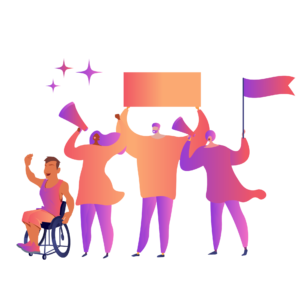Definitions
Sexual and reproductive health and rights (SRHR) encompass bodily integrity, the right to express one’s gender identity and sexual orientation freely without discrimination or persecution, and the ability to choose if, when, and how many children to have without coercion, discrimination, or violence.
In the Middle Ease and North Africa (MENA) region, women’s and girl’s SRHR is controlled by patriarchal norms through gender-based violence, forced marriage, and female genital mutilation. While males also face sexual abuse, females are the most affected due to the inequality and privileges that are offered to males in the region. It is important to highlight that there are insufficient efforts to include men in the available services and to engage them in public education about SRHR. A key factor affecting youth SRHR violations in the region is stigma. Stigma involves the co-occurrence of “labeling, stereotyping, separation, status loss, and discrimination” in contexts where power is exercised. Shame about sex has become ingrained in religious institutions, schools, laws, and popular media. Menstruating women are often considered unclean, while men face stigma around topics like condom use, where both feel ashamed to ask for help.
The Impact on Youth
Social Impact
Females often hide sanitary pads in a lunch box or pencil case to avoid the shame of others knowing they are menstruating. A study found that 60% of females in the region feel ashamed when menstruating, leading to behaviors like hiding sanitary products (UNICEF, 2020).
On the other hand, males feel embarrassed to ask for a condom in a pharmacy from a female. Believe it or not, as I have worked as a pharmacy assistant and have faced this, they would search for a male to ask for a condom. A survey revealed that 70% of young men in the region would prefer to avoid purchasing condoms altogether if they had to ask a female pharmacist (Arab Barometer, 2021).
Educational Impact
Less than 10% of schools in the region offer any form of sexual education, and when they do, it is often limited to basic biology without addressing broader SRHR issues (UNFPA, 2019). The government’s curriculum in most of the region excludes sexual education. If, by coincidence, you find a school that is conducting classes regarding sexual education, you find them separating the females from the males, where each gender only learns about their sexuality and not the other.
Health Impact
Females are often shy about visiting a gynecologist before marriage due to a lack of education on the importance of regular visits to a gynecologist, even in the absence of a sexual relationship. Women also face many violations from the gynecologist without realizing that their rights have been breached. While men feel embarrassed to go ask for an STD test because they fear the judgment of the surrounding community, they will become socially unaccepted. In the region, only 30% of men feel comfortable discussing their sexual health openly, leading to delayed or neglected care (WHO, 2021).

What Can You Do?
As a youth, the cycle of change starts with you.
The first step is to educate yourself by enrolling in an online course, reading reliable resources on SRHR, and volunteering in the community. By doing so, you can help reduce stigma and correct the misconception that the community has passed on to you. Support your friends and guide them on what to do regarding SRHR, as well as which clinics might help and what they offer. Encourage open dialog with friends and family about menstruation and contraception to break the taboo on these topics.
When you have gained enough information and experience in volunteering for SRHR, you can conduct a workshop, either online or in person, in a setting that feels safe for you. Be careful. SRHR is a sensitive topic in some countries, so choose your location and topic wisely. Remember, your safety comes first. Create safe spaces in schools or universities to discuss SRHR topics, share experiences, and provide support. Through safe spaces, you don’t feel alone in working to change, and you build a community dedicated to advocacy.
Conclusion
Despite all the efforts of organizations on SRHR, until now, the topic has been considered taboo in the MENA region, where stigma is still a thing. The level of education, social class, and community norms play a role in the stigma regarding SRHR. Youth are the most affected, especially their sexual health, which is threatened due to the social attitude. That’s why the action should start with you, youth.
Let’s stand together to break the silence and put an end to the stigma surrounding SRHR. Educate yourself, speak openly, and challenge stereotypes whenever they arise. By taking these actions, you can help create a more informed, compassionate, and empowered society where SRHR is no longer shrouded in shame.

Your voice and actions can make a lasting impact. Let’s start the change today.
